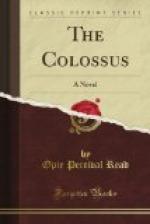The trial came. In the expectancy with which Chicago looks for a new sensation, Brooks had been almost forgotten by the public. His confession had robbed his trial of that uncertainty which means excitement, and there now remained but a formal ceremony, the appointment of his time to die. The newspapers no longer paid especial attention to him, and such neglect depresses a murderer, for notoriety is his last intoxicant. It seemed that an unwarranted length of time was taken up in the selection of a jury, a deliberation that usually exposes justice to many dangers; and after this the trial proceeded. The deposition of Mrs. Colton was introduced. It was a brief statement, and after leading up to the vital point, thus concluded: “I must have been asleep some time, when my husband awoke me. He said that he thought he heard a noise in the vault-room. I listened for a few moments and replied that I didn’t think it was anything. But he got up and took his pistol from under the pillow and went into the vault-room. A moment later I was convinced that I heard something, and I got up, and just as I got near the door the light blazed up and at the same moment there was a loud report as of a pistol; and then I saw my husband fall—saw Mr. Brooks wheel about and run out of the room. This is all I remember until I found myself lying on the bed, unable to move or speak.”
Brooks set up a plea for mercy, and his lawyers were strong in the urging of it, but when the judge delivered his charge it was clear that the plea was not entertained by the court. The jury retired, and now the courtroom was thronged. To idle men there is a fascination in the expected verdict, even though it may not admit of the quality of speculation. The jurymen could not be out long—their duty was well defined; but an hour passed, and the crowd began gradually to melt away. Two hours—and word came that the jury could not agree. It was now dark, and the court was adjourned to meet in evening session. But midnight struck, and still there was no verdict. What could be the cause of this indecision? It was a mystery outside, but within the room it was plain. One man had hung the jury. In his community he was so well known as a sectarian that he was called a hypocrite. He was not thought to be strong except in the grasp he held upon bigotry, but he succeeded in either convincing or browbeating eleven men into an agreement not to hang Brooks, but to send him to the penitentiary for life; and this verdict was rendered when the court reassembled at morning.




